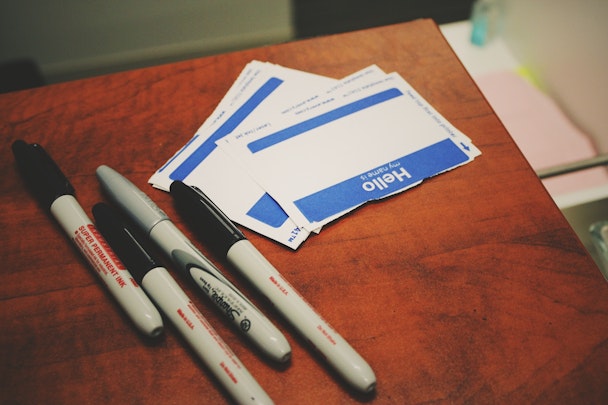Name game: advertising founders tell the stories behind their agency names
With creative shop Mother facing a lawsuit over the name of its sister agency, we ask agency founders how they settled on their agency names – and about the unexpected consequences that followed.

What should you call your new agency? Here’s the inspiration behind some of the industry’s top names
While most ad agencies, as B2B enterprises, don’t need to fret about public perception of their own brands, a decent handle can literally make your name within the industry. It tells people you’re different, dynamic and (one hopes) a decent place to work.
It might take you to some strange places, though – the High Court of England and Wales, for example. London-based Other Creative this week filed a claim against creative agency Mother over the company‘s use of the name ‘Other‘ for its recently-launched sister agency; among other demands, Other has requested an injunction against Mother on the use of the word Other.
Other Creative‘s founder, Jon Dobinson, doesn’t hold a trademark for his company’s name (though this isn’t necessary in UK law to make a claim of ‘passing off‘). That’s something Greg Clark, managing director of Sheffield ad agency Über, made certain to do when he helped found his business. But, as he tells the story behind his agency’s name, it hasn‘t always been enough to guard against confusion.
He recalls that back in 2003 ”the Cindy Crawfords, Christie Turlingtons and Naomi Campbells of the world were so synonymous with the term ’super model’ that when a new breed of younger ‘super models’ came along, the press felt the need to promote the established fashion icons”.
He explains: ”There being no bigger and better word for ‘super’ in the English language, they felt the need to steal one from the Germans, and the term ’Über model’ was born.
”In German it means: over, above, more than. This fitted perfectly with what my vision for the new company would be about. It has never been about us believing we are ’Über’, but a mission statement that we always try to be for every client and every job.
”So confident was I in the name that I registered many Über URLS: Ubercreative, Uberhotels, Uberbars. I didn’t go as far as to register Ubertaxis. Hell, if someone wants to start a taxi rank and call it Über good luck to them ... fast forward six years and a certain app launched.
”So we were here first, we have built up 18 years of brand equity behind the name and we are still proud of it. We will just have to put up with the 14 phone calls a day for taxis and chicken fried rice.”
On-the-spot inspiration can be a recipe for success; Grey Advertising was named for the color of its office walls, and it’s done OK in the century and change since its founding. But there are other approaches.
Until the 80s, most agencies of note were named after their founders or controlling partners. Following the example of Alexander the Great (who named over 20 cities after himself and one after his horse) worked out great for Dan Wieden, David Kennedy, Ed Mather, David Ogilvy, Charles and Maurice Saatchi and the quartet behind TBWA: William G Tragos, Claude Bonnange, Uli Wiesendanger and Paolo Ajroldi.
That approach didn’t sit right with the founders of Edinburgh ad shop The Leith Agency. As John Denholm, co-founder of Leith, recalls: ”When we started in 1984, ad agencies all sounded like solicitors – brass plaques, founders’ names and an apologetic attitude to creativity. The exception was Hall Advertising, where we came from, which was brilliantly creative. But it still looked very ‘establishment‘.
”We knew we had to play to a rebellious, challenger brand positioning, and to open in Leith was perfect for that. Leith had always been Edinburgh’s chippy little neighbor, and in the 80s was emerging from being a semi-derelict dockland into being a place where something ‘interesting‘ was happening. And we just thought: ’Rather than call ourselves Mill, Stanier and Denholm, if we’re in Leith let’s do it properly and call ourselves The Leith Agency.’
”It’s hard to believe now, but that sounded pretty rebellious in the early 80s and it set the right attitude when we moved beyond challenging the Edinburgh establishment to giving the London establishment a regular kicking.”
A name can also express an ambition. Small.World, a startup agency founded this year by former Dark Horse creatives Dan Salkey and Harvey Austin, was set up to serve early-stage startups and businesses with lean teams. And The GOAT Agency borrowed the language of peacocking athletes and verbose sports commentators to hint at its specialism as a social and sports marketing agency.
Of course, none of that will fly if you can‘t secure the domain name. Social media and influencer agency We Are Social chose its brand for its simplicity, capacity to travel – and because the URL was going for a song.
Nathan McDonald, co-founder and group chief executive at We Are Social, explains: ”Back in 2008 the market was still learning what social was all about. We wanted to make a statement with the name, and we knew we didn’t want our names to feature: we wanted to differentiate from the traditional agencies, and besides it wouldn’t easily scale globally. We brainstormed a few names around the idea of conversation, social and dialogue, but getting a URL to match was tricky. When we said the name We Are Social out loud, then found the URL was available, we knew it was right. The name of our new agency, but also a statement about humanity.”
After all, while Shakespeare argued that ”any other name would smell as sweet,” he didn‘t have to worry about SEO.

